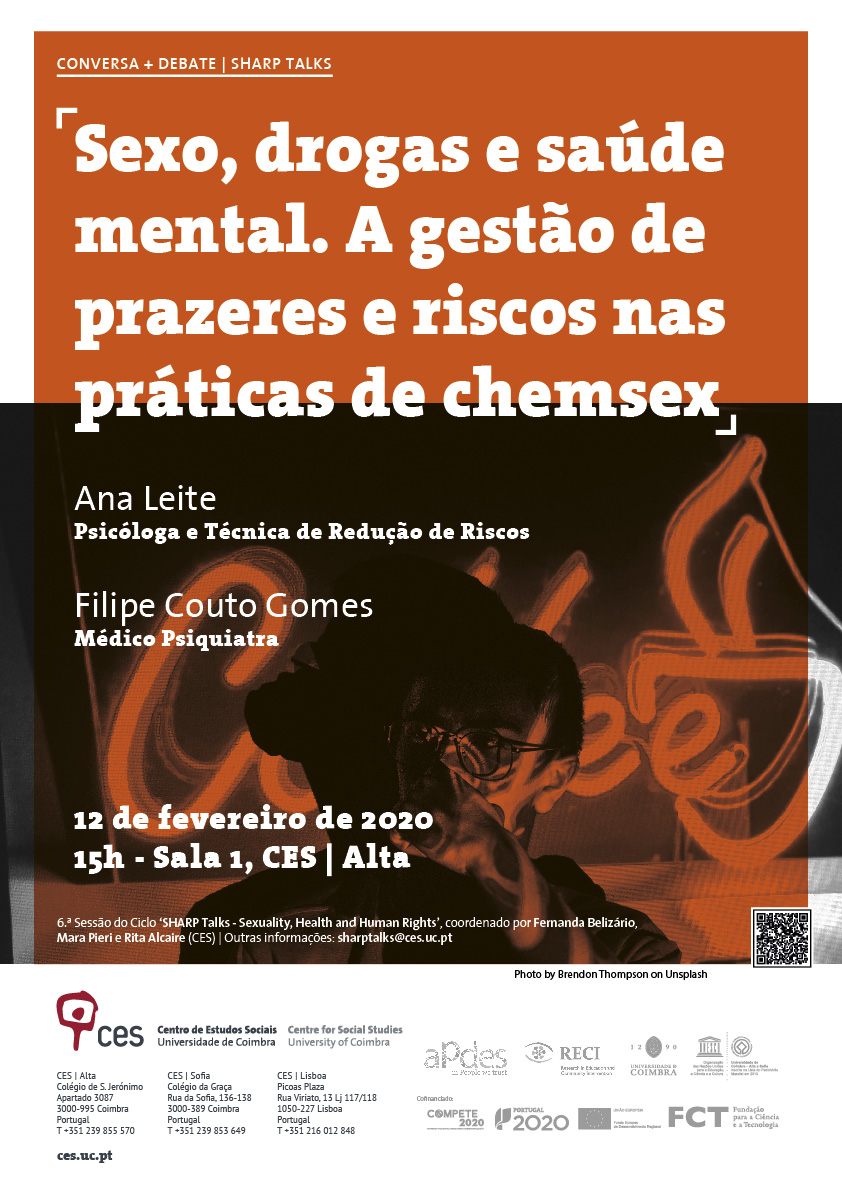Talk + Debate | SHARP TALKS
Sex, drugs and mental health. Managing pleasures and risks in chemsex practices
Ana Leite
Filipe Couto Gomes
February 12, 2020, 15h00
Room 1, CES | Alta
Overview
The term “chem(ical) sex” was coined to name the use of new psychoactive substances by men who have sex with men (MSM) in order to facilitate and enhance sexual behaviours. Currently, the term chemsex represents an umbrella concept, as it can be associated with the most varied sexual and consumption practices.
This SHARP Talk discusses the intimate combination of these two themes still considered taboo - sex and drug use - leading to the constant discredit and demonization of this theme. The contributions address the main psychosocial determinants of sexual and mental health in MSM, and also the role that different actors can play in promoting it. Experiences of social homophobia, the establishment of self-stigma(s) – which can include, in addition to sexual orientation, HIV status, gender expression and masculinity performance, aging, among other dimensions of difference – socialization in heteronormativity and homonormative pressures, are of particular importance regarding the tensions and ambivalences under this theme. In addition, between the enhancement of pleasure and the possibility of putting physical and psychological health at risk, there is a great void that must be filled, cautiously and critically, with theoretical and practical knowledge, both through the scientific knowledge that has been produced, as in the light of the knowledge that results from the users' experience.
Co-organisers: SHARP Talks and APDES - Piaget Agency for Development.
The mental and sexual health of men who have sex with men: the case of chem(ical) sex | Filipe Couto Gomes
In Lisbon, community organisations in the areas of sexual or mental health accompany MSM who, within the scope of chemsex practices, have needs that include clarification on substances, risk reduction strategies - including access to HIV Pre-Exposure Prophylaxis Consultations (PreP) - and the promotion of sexual and mental well-being. For whom chemsex has acquired an addictive and disruptive character, support has become available in a collaborative project between the Centro das Taipas (DICAD, ARS-LVT) and the Centro Hospitalar Psiquiatrico de Lisboa, carried out by Sexology and Addictive and Dependent Behaviours therapists.
In general, MSM who notice decreased control over chemsex practices mention some discomfort with their body image, sexual performance demand, risk of HIV transmission and/or anticipation of rejection. Experiences of social homophobia, the establishment of self-stigma(s) – which can include, in addition to sexual orientation, HIV status, gender expression and masculinity performance, aging, among other dimensions of difference – socialization in heteronormativity and homonormative pressures, are of particular importance regarding this tension and ambivalence. These aspects are also of great relevance in the emergence of other mental and sexual health difficulties, such as depressive syndromes, social and other anxiety, sexual dysfunctions, sexual and/or love dissatisfaction, sexually transmitted infections, and extreme of this harmfulness, loneliness and suicide.
Chemsex: Between pleasure and risk - Psychoactive substances as a tool for (self) knowledge and (self) discovery | Ana Leite
What are the substances most associated with this experience? And why? Can they be beneficial and what are the risks involved? Between the enhancement of pleasure and the possibility of putting physical and psychological health at risk, there is a great void that must be filled, cautiously and critically, with theoretical and practical knowledge, both through the scientific knowledge that has been produced, as in the light of the knowledge that results from the users' experience. The intimate combination of two issues still considered taboo - sex and drug use – leads to the constant discredit and demonization of this theme, whose contributions transcend the individual level and are, increasingly, gaining ground and relevance in areas of study of undeniable importance, as is the case of psychology, albeit through channels deemed alternative.
Guests:
Filipe Couto Gomes is a psychiatrist, MA in Medicine from the University of Porto with a dissertation on clinical monitoring in gender transition (2011). Conducted specific training in Psychiatry at the Centro Hospitalar Psiquiatrico de Lisboa, maintaining collaboration with its Clinical Sexology Consultation. Post-graduate in Sexology, by ISPA, and in Social and Cultural Psychiatry, by the University of Coimbra. Collaborates with several community mental health projects, aimed at LGBT+ youth and adults, people living with HIV and people sex workers.
Ana Leite holds a MA in Psychology of Deviant Behaviour and Justice, active in recreational context interventions in diverse party settings, since 2013. Themes associated with psychoactive substance consumption have always been at the core of her professional experience, ranging from working in therapeutic communities to street teams.
Coordinationo: Fernanda Belizário, Mara Pieri andRita Alcaire (CES) | More information: sharptalks@ces.uc.pt


